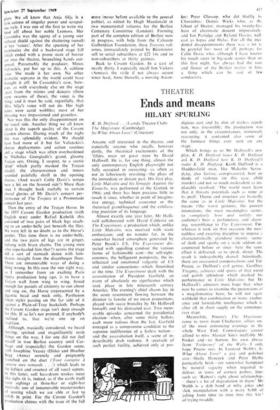THEATRE
Ends and means
HILARY SPURLING
K. D. Dufford . . (Lamda Theatre Club) The Magistrate (Cambridge) So What About Love? (Criterion) Anyone still interested in the theatre, and especially anyone who recalls, however dimly, the theatrical excitements of the 'fifties, must set great store by David Halliwell. He is, for one thing, almost the only contemporary English playwright not fully occupied in recreating—as often as not in laboriously rewriting—the plays of the immediate or distant past. His first play, Little Malcolm and his Struggle Against the Eunuchs, was performed at the Garrick in 1966; and there has been precious little to touch it since, whether in point of imagina- tive energy, technical assurance or the rhetorical grandiloquence and the exhilara- ting precision of its language.
Almost exactly one year later, Mr Halli- well collaborated with David Calderisi on The Experiment, a production which, unlike Little Malcolm, was received with scant enthusiasm; and no wonder for, in the somewhat heated atmosphere generated by Peter Brook's US, The E.vperintent dis- sected with appalling candour the various forms of fashionable cant—the self-right- eousness, the belligerent pomposity, the in- tellectual and emotional vulgarity of US and similar concoctions—which flourished at the time. The Experiment dealt with the assassination of President Garfield, an event of absolutely no significance which took place in late nineteenth century America. The evening's chief charm lay in the acute resentment flowing between the director (a fanatic of no mean proportions, played with suave brutality by Mr Halliwell himself) and his distracted cast. Two mem- orable episodes concerned the presidential election—when, after some thirty ballots, each more tedious than the last, Garfield emerged as a compromise candidate to the supreme indifference of a listless nation-- and the assassination itself, a scene of in- describably drab violence. A spectacle of such perfect futility, achieved only at pro-
digious cost and by dint of tireless repeti- tion, was irresistible; the production was not only, in the circumstances. immensely reassuring. it contained also some of the funniest things ever seen on any stage.
Which brings us to Mr Halliweles new play, K. D. Dufford hears K. D. Dullard ask K. D. Dullard how K. D. Dufford'll make K. D. Dufford. Keith Dufford is a Huddersfield man, like Malcolm Scraw- dyke, also furtive, conspiratorial, bent on deeds of violence (in this case, child murder) and not so much malevolent as im- placably resolved: The world must learn that it thwarts potentials such as mine at its peril'. Theme and structure are basically the same as in Little Malcolm; but the means ('the worst gestures, the poorest intonations, the most meaningless scenes. to completely bore and stultify our audience') bear a perfunctory. and alarm- ing, resemblance to The Experiment. For. whereas it took on that occasion the moss ruthless and exacting discipline to impose it characteristically grandiose inanity--scene• of sloth and apathy on a scale seldom en- countered before or since—here the same effect is delivered, so to speak, direct. The result is indescribably dismal. Admittedly. there are occasional compensations and Tirr. Preece, as Dufford's evil genius, Geoffrey Thagney. achieves odd spurts of that weird and garish splendour which marked his performance in Little Malcolm: but Mr Halliwell's admirers must hope that, when next he comes to examine the pretensions of a megalomaniac hero, he will not agair withhold that combination or irony. exuber ance and formidable intelligence which is after all, in short supply on the contempo rary stage.
Meanwhile. Pinero's The Ma,gistrate come to town from Chichester. offers one of the most entrancing evenings in the whole West End. Connoisseurs cannot afford to miss Alastair Sim's ineffable Mt Posket and—to borrow his own phrase from 'Trelawney' of the Wells--I only hope Pinero sees. In Leonard Webb's So What About Love? a gay and polished cast—Sheila Hancock and Peter Blythe particularly brisk—are somewhat hampered by natural sagacity when required to deliver, in tones of earnest pathos, lines such as: 'Robert's right about relationships --there's a lot of degradation in them.' Mr Webb is a dab hand at nifty jokes and slick manipulation with a nasty habit of jolting from time to time into this kin•' of trying twaddle.






































 Previous page
Previous page